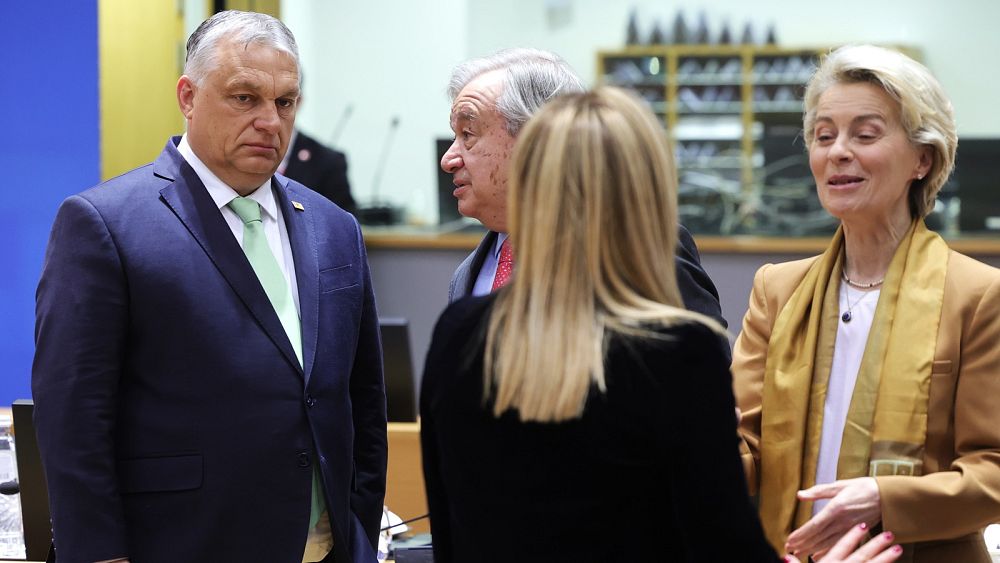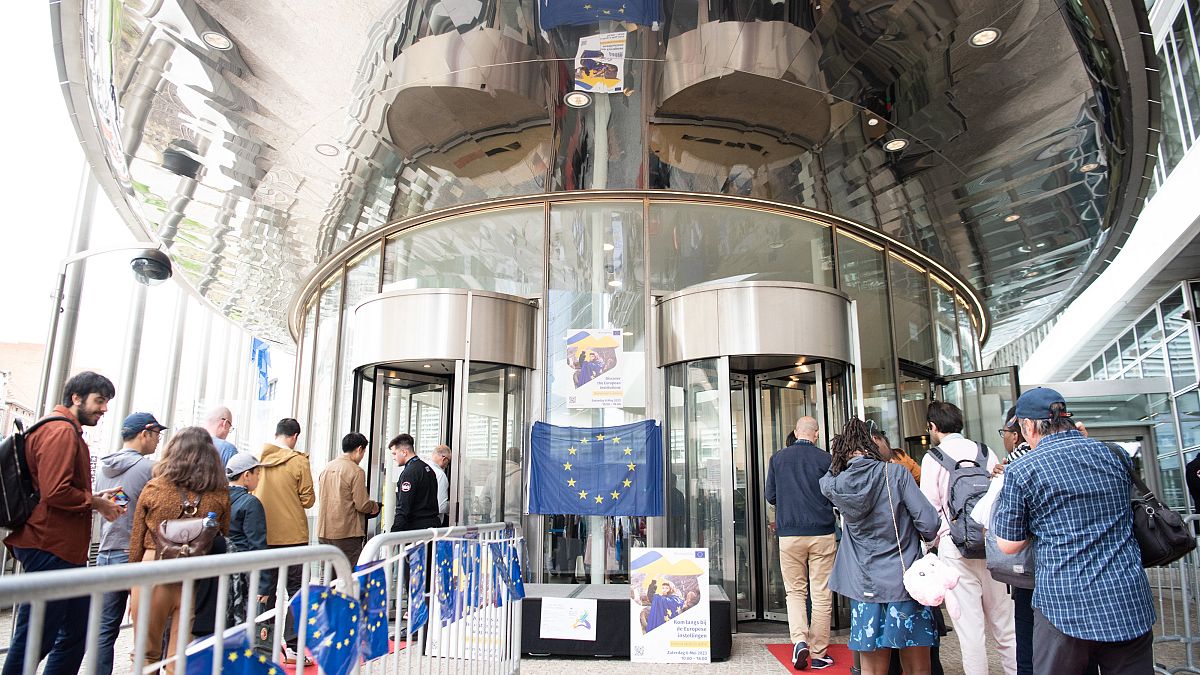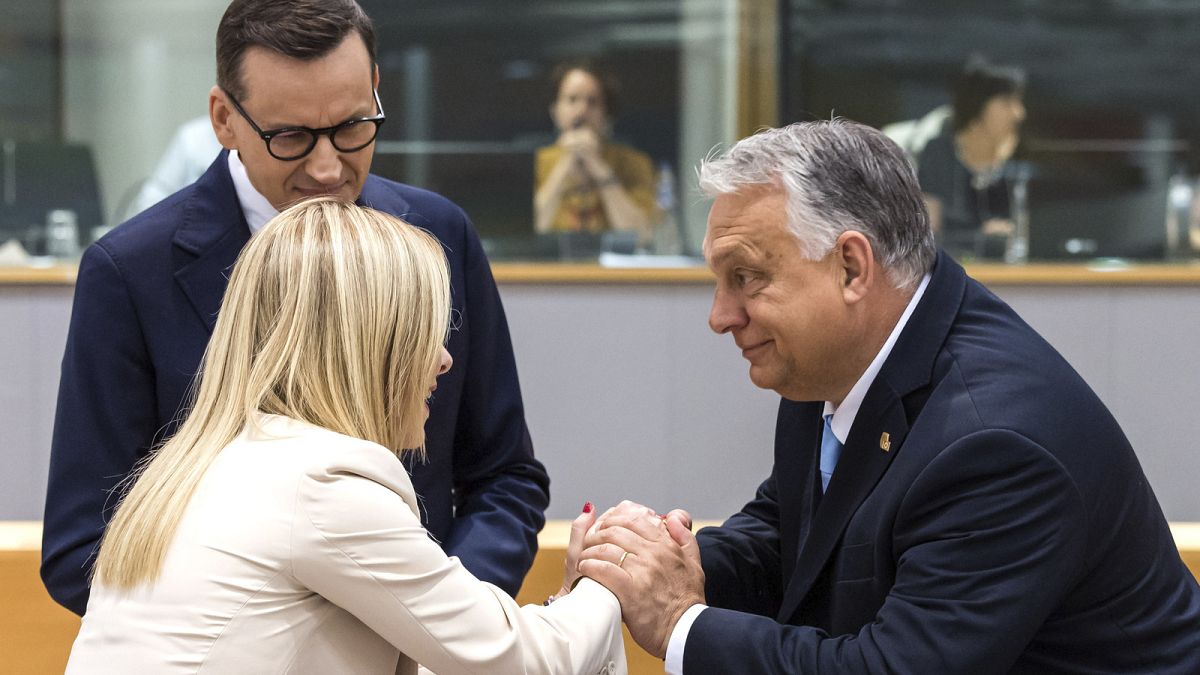World
EU chiefs hail new migration deal while Orbán calls it ‘unacceptable’

Official reactions are pouring in after home affairs ministers struck a major deal to revamp the European Union’s migration and asylum policy.
Ursula von der Leyen, who, upon becoming president of the European Commission, made the overhaul one of her top priorities, called the agreement a “huge milestone.”
“Migration is a European challenge,” von der Leyen said in a tweet. “Working together, we can achieve a common solution.”
Charles Michel, president of the European Council, an institution that has witnessed countless debates on migration over the past years, most of which were as polarising as they were fruitless, said the deal represented “truly a big step.”
Von der Leyen and Michel sent their personal congratulations to Ylva Johansson, the European Commissioner for home affairs, for her perseverance and hard work.
In her capacity, Johansson has continuously defended the need to move forward with the so-called New Pact on Migration and Asylum, a holistic proposal that she presented in September 2020 with the aim of establishing a unified, coordinated migration policy among the 27 member states.
The New Pact, which seeks to replace the ad-hoc crisis mode that is currently in place, has been the focus of intense discussions and was at times seen as a proposal condemned to failure.
But on Thursday evening, in a surprising turn of fate, home affairs ministers gathered in Luxembourg struck a provisional deal on the pact’s two main pillars: a system of mandatory solidarity to manage the arrival of asylum seekers and a common framework to streamline border procedures.
“It has been a marathon,” Johansson said.
The vote took place under the rules of qualified majority, with only two countries standing out in their opposition: Hungary and Poland.
Bulgaria, the Czech Republic, Malta, Lithuania and Slovakia abstained, diplomats with knowledge of the negotiations told Euronews.
“Forced relocation does not solve the problem of migration, but it violates the sovereignty of the member states,” Polish Prime Minister Mateusz Morawiecki said in a short tweet published on Friday morning.
“Poland will not pay for the mistakes of the immigration policies of other countries.”
His Hungarian counterpart, Viktor Orbán, echoed his criticism and denounced Brussels for “abusing” its legal powers and imposing the relocation of migrants – something that is actually not foreseen under the proposal.
“This is unacceptable, they want to forcefully turn Hungary into a migrant country,” Orbán said, according to his spokesperson.
His deputy minister of interior, Bence Rétvári, who took part in the Luxembourg discussions, expanded upon Budapest’s position, saying the reform will place a “disproportionate burden” on Hungary and encourage the arrival of new migrants.
Rétvári claimed “pro-migration governments” had pressured other member states into accepting the draft law, making a “mockery” of the EU’s decision-making process.
The European Commission insists the new system is not based on “mandatory relocation” but on “mandatory solidarity.” The reform will offer member states three options to collectively cope with situations of migration pressure:
- Accept a number of relocated asylum-seekers.
- Pay for the return of rejected applicants to their country of origin.
- Finance operational support, such as infrastructure and personnel.
The agreement reached by the EU Council foresees 30,000 relocations per year across the bloc and a €20,000 one-off payment for each rejected applicant.
“Member states have full discretion as to the type of solidarity they contribute. No member state will ever be obliged to carry out relocations,” the EU Council said in a statement explaining the outcome of Thursday’s meeting.
The deal, however, is provisional and still needs to be negotiated with the European Parliament, which has a somewhat diverging position on the matter.
“We can find a way forward,” said the parliament’s president, Roberta Metsola.
“We can protect our borders and find an approach that is fair and humane with those in need of protection, firm with those not eligible and strong against traffickers exploiting the most vulnerable.”
Tomas Tobé, the Swedish MEP who acts as a rapporteur for the solidarity mechanism, welcomed the breakthrough as “very important news” and said negotiations would start “already next week.
“Much work lies ahead,” Tobé said.
Meanwhile, Tineke Strik, a Dutch lawmaker who sits with Greens, predicted talks would be “tough” because the EU Council has chosen to “lock” asylum seekers at the external borders to avoid sharing the “responsibility.”

World
Indian government employee accused of directing foiled assassination plot can be extradited to US, court says

- A petition by an Indian man who attempted to avoid extradition to the U.S. has been rejected by the Czech Constitutional Court.
- Nikhil Gupta is accused of directing a foiled plot to kill a Sikh separatist on American soil.
- Gupta was arrested by Czech authorities in June last year when he traveled from India to Prague.
The Czech Constitutional Court rejected on Wednesday a petition by an Indian man trying to avoid extradition to the United States, which suspects him of involvement in an unsuccessful plot to kill a Sikh separatist on American soil.
A final decision on whether to extradite Nikhil Gupta will be made by Justice Minister Pavel Blazek.
The court said it ruled that lower courts had given due consideration to aspects that may prevent extradition, rejecting the complaint brought by Gupta. It also rejected arguments that the case was political.
“The Constitutional Court did not find any circumstance for which declaring extradition admissible would lead to a violation of any of the constitutionally guaranteed fundamental rights and freedoms,” the court said in a statement.
INDIAN GOVERNMENT EMPLOYEE ACCUSED OF DIRECTING FOILED ASSASSINATION PLOT OF SIKH ACTIVIST ON US SOIL
“For the complainant, this brings the proceedings before the Czech courts to an end.”
Activists of the Dal Khalsa Sikh organization, a pro-Khalistan group, stage a demonstration demanding justice for Sikh separatist Hardeep Singh Nijjar, who was killed in June 2023 near Vancouver. The Czech Constitutional Court rejected on Wednesday a petition by an Indian man trying to avoid extradition to the United States, which suspects him of involvement in an unsuccessful plot to kill a Sikh separatist on American soil. (NARINDER NANU/AFP via Getty Images)
A spokesman for the Justice Ministry said Blazek would evaluate the decision before making a ruling on the extradition itself.
Gupta has been accused by U.S. federal prosecutors of working with an Indian government official on a plot to kill a New York City resident who advocated for a sovereign Sikh state in northern India.
Gupta was arrested by Czech authorities in June last year when he traveled from India to Prague.
The Czech Republic has in the past agreed to U.S. extradition requests.
World
Ombudsman probes Commission's senior staff 'revolving door'

The move of an experienced senior official to a private law firm has prompted a probe by Emily O’Reilly, responsible for investigating suspected maladministration.
The latest move of a senior European Commission antitrust official to a private law firm has prompted a probe by the EU’s Ombudsman, who is worried about conflicts of interest.
Revolving doors between the private and public sector can have a “corrosive effect” on public trust, fueling euroscepticism and undermining EU interests, said Emily O’Reilly, in a letter published today (22 May).
In an 8 May press release, law firm Paul, Weiss announced the hire of Henrik Morch, a director in the Commission’s antitrust arm with a 30-year career.
The New York-based law firm cited Morch’s “extensive experience” in handling merger cases as a benefit to the law firm’s clients – a perhaps unfortunate turn of phrase that raised particular hackles for O’Reilly.
“The clear impression is that the Commission has allowed one of its senior officials to work for a non-EU company that anticipates major benefits from that inside knowledge,” said O’Reilly, who investigates suspected maladministration in EU institutions.
“As this move was not forbidden, the Commission should, without delay, publish the restrictions it has placed on the move,” added her letter, dated 17 May.
To make matters worse, she said, Paul, Weiss hasn’t been clear about its Brussels activities, and the Commission hasn’t said if it will impose any restrictions on Morch’s work with it.
O’Reilly called for the Commission to reform its practices in a probe which closed in 2022 – and which specifically concluded that officials from the competition directorate-general, DG COMP, should be banned from moving to work at private firms that work in related issues.
That followed a number of controversial hires, including the move of Carles Esteva Mosso, a deputy director-general at DG COMP, to become an antitrust partner at Latham & Watkins, and that of Adam Farkas, executive director of the EU’s banking agency, to lobby group the Association for Financial Markets in Europe.
Recent research by Transparency International, published just weeks before the bloc goes to the polls, shows that MEPs collectively earn millions of euros from jobs additional to their lawmaker salary.
Those extra paid positions are permitted under current rules – but the lobby group cites concerns over conflicts of interest, particularly when MEPS work for company that lobby the EU.
Morch, the Commission and Paul, Weiss did not immediately respond to a request for comment.
World
New Caledonia protesters, police play 'cat and mouse' before Macron arrives

-

 News1 week ago
News1 week agoSkeletal remains found almost 40 years ago identified as woman who disappeared in 1968
-

 World1 week ago
World1 week agoUkraine’s military chief admits ‘difficult situation’ in Kharkiv region
-

 Movie Reviews1 week ago
Movie Reviews1 week agoAavesham Movie Review
-

 Education1 week ago
Education1 week agoVideo: Protesters Scuffle With Police During Pomona College Commencement
-

 World1 week ago
World1 week agoEU's divided right wing can disrupt if it finds greater unity: experts
-

 News1 week ago
News1 week agoNevada Cross-Tabs: May 2024 Times/Siena Poll
-

 World1 week ago
World1 week agoPro-Palestinian university students in the Netherlands uphold protest
-

 News1 week ago
News1 week agoStudent protests caused mostly minor disruptions at several graduation ceremonies






/cdn.vox-cdn.com/uploads/chorus_asset/file/25459708/Screenshot_2024_05_22_at_9.08.56_AM.png)









